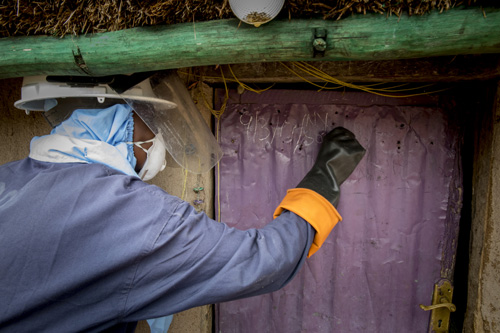 Rwanda has made remarkable progress in the fight against malaria. All major malaria indicators have decreased significantly from 2005 to 2012. Rwanda’s health management information system reported an 86 percent reduction in malaria incidence, an 87 percent reduction in malaria morbidity, a 74 percent reduction in malaria mortality, and a 71 percent reduction in malaria test positivity rate. While there was an upsurge from 2012 to 2016, Rwanda decreased its malaria incidence by more than 50 percent from 2016-17 to 2019-20.
Rwanda has made remarkable progress in the fight against malaria. All major malaria indicators have decreased significantly from 2005 to 2012. Rwanda’s health management information system reported an 86 percent reduction in malaria incidence, an 87 percent reduction in malaria morbidity, a 74 percent reduction in malaria mortality, and a 71 percent reduction in malaria test positivity rate. While there was an upsurge from 2012 to 2016, Rwanda decreased its malaria incidence by more than 50 percent from 2016-17 to 2019-20.
In September 2019 and January 2020, through VectorLink Rwanda, IRS was conducted in three districts, targeting 304,798 structures, using Fludora Fusion insecticide, a clothianidin/deltamethrin combination. Spraying was conducted on September 2-27 in Nyagatare and Kirehe Districts, and on January 20 up to February 11, 2020, in Ngoma District. The Spray operators found 226,170 structures in Nyagatare and Kirehe districts, and sprayed 221,719, for a coverage rate of 98%. The IRS spray campaign in Ngoma commenced on 20 January and ended on 11 February 2020. During the twenty-day spray campaign in Ngoma District, spray operators found more structures (93,603) than the original target of 89,331 structures and sprayed 92,805 which is 99.2% spray coverage.
In August–September 2020, through VectorLink Rwanda, IRS was conducted in three districts, targeting 312,362 structures, using Fludora® Fusion insecticide, a clothianidin/deltamethrin combination. Spraying was conducted from August 24 through September 18, 2020 in Nyagatare, Kirehe, and Ngoma Districts. Spray operators found 328,676 structures and sprayed 327,704, for a coverage rate of 99.7%.
In August–September 2021, through VectorLink Rwanda, IRS was conducted in three districts, targeting 327,712 structures, using organophosphate (Actellic® 300CS) insecticide. Spraying was conducted from August 23 through September 17, 2021 in Kirehe, Ngoma, and Nyagatare, Districts. Spray operators found 347,963 structures and sprayed 346,277, for an IRS coverage rate of 99.5%.
Rwanda has 15 districts with high malaria burden. In 2021, the Government of Rwanda and its IRS partners (the Global Fund and PMI) were able to spray 14 out of these 15 districts. The fifteenth district received effective vector control through Interceptor® G2 long-lasting insecticide-treated nets (LLINs).
In year five (March 2022 – February 2023), PMI VectorLink Rwanda will work with the Ministry of Health (MOH)/Rwanda Biomedical Center (RBC)/Malaria and Other Parasitic Diseases Division (MOPDD), and the districts themselves, to spray 339,567 targeted structures in three districts in Eastern Province using Actellic® 300CS insecticide; an additional 6,710 structures will be targeted in Mahama Refugee Camp. The project’s primary objective is to reach a minimum spray coverage of 85% of the eligible structures found in each district by implementing high-quality IRS operations and protecting approximately 1,340,280 residents. The project will implement Government of Rwanda, World Health Organization (WHO) and PMI VectorLink guidelines on prevention of COVID-19 before and during implementation of IRS to ensure the safest possible conditions for the implementing teams and the communities.
In addition to spraying, the project will carry out the following activities:
- Strengthen capacity at the national, regional, district, and local levels to manage IRS operations, including planning, spraying, resource allocation, monitoring and evaluation (M&E), and entomological monitoring and quality controls.
- Support ITN durability monitoring of dual active ingredient (Interceptor® G2), piperonyl butoxide (PermaNet® 3.0), and standard (Yahe®, Olyset®) nets implemented by the Government of Rwanda.
- Support capacity strengthening of the MOPDD entomology lab, including the procurement of reagents and supplies for the entomology laboratory and the malaria Technical Working Group.
- Technical support to the entomology laboratory.
- Conduct training with a focus on IRS supervision and spray techniques to improve the overall quality of spraying.
- Conduct regular M&E of project activities to ensure alignment with set targets and objectives.
- Mainstream gender equality and female empowerment by ensuring women’s equitable participation across project activities, such as spray operations, supervision, community mobilization, entomology, and spray planning.
- Coordinate community mobilization activities in collaboration with stakeholders to raise awareness of IRS and to encourage beneficiary and stakeholder ownership. The project will recruit the head of the village and the in-charge of security to sensitize the community in their villages during spraying. All community mobilization activities will follow PMI VectorLink COVID-19 mitigation measures.
- Carry out a logistics assessment in all PMI-funded IRS districts, and arrange all procurement, shipping, delivery, and storage of IRS commodities.
- Strengthen the IRS logistics and warehousing system through enhanced training, supervision, and digitalization of insecticide tracking.
- Conduct wall bioassay, vector density monitoring, and behavioral studies and support the MOPDD in monitoring insecticide resistance.
- Collaborate with other implementing partners to implement IRS in 14 districts (11 supported by Government of Rwanda/The Global Fund and 3 supported by PMI VectorLink Rwanda) to complement each other’s work and avoid duplication of efforts. Additionally, VectorLink Rwanda will share training curricula, support data management and reporting, and supervision of IRS activities.
- Ensure safe and correct insecticide application, thus minimizing human and environmental exposure to IRS insecticides, in compliance with the Pesticide Evaluation Report and Safer Use Action Plan and Supplemental Environmental Assessment (SEA).

